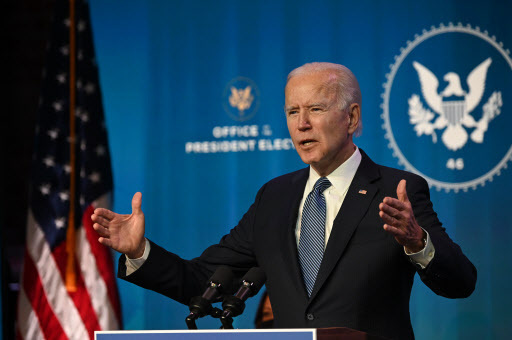 |
President-elect Joe Biden (AFP-Yonhap) |
WASHINGTON -- The new US administration of Joe Biden must act quickly to prevent North Korea from setting the stage by creating a crisis, a US think tank said Tuesday.
The Korea Economic Institute of America (KEIA) also advised the incoming US administration to see if US-North Korea denuclearization talks could be picked up from where they were left off by the outgoing Donald Trump administration.
"The Biden Administration should act quickly on North Korea to prevent Pyongyang from setting the stage by creating a crisis, as it has in the past," it said.
Many experts here and in South Korea have noted the North will likely stage provocations unless spoken to or contacted by the Biden administration in the early stages of the new administration.
"One new approach might be for the United States and South Korea to make a joint, public offer to North Korea including both demands and concessions," the report said.
The report also urged the Biden administration to build on the progress made by Trump if possible.
"It would be useful to conduct a thorough post-mortem of what actually took place at the February 2019 Hanoi Summit and see whether any part of it might still be built upon," the KEIA said in a report that included 10 recommendations for the incoming US president, set to be inaugurated next Wednesday.
Trump held three meetings with North Korean leader Kim Jong-un, but their talks have stalled since their 2019 summit in the Vietnamese capital ended without a deal.
The first Trump-Kim summit was held in Singapore in June 2018.
The report also included a recommendation for Seoul to consider making a "coordinated response" to China's economic pressure and playing a role in shaping its future behavior with other countries in the region.
"South Korea and the United States should discuss the issue of Chinese economic pressure with countries of the region to consider whether a coordinated response would be appropriate," it said.
"South Korea should consider its role in the evolving coordination among like-minded countries, including the United States, in shaping China's international behavior."
Tuesday's report is based on six discussion sessions held between December 2019 and November 2020, involving more than three dozen US scholars and commentators, according to the KEIA. (Yonhap)




![[Weekender] Korea's traditional sauce culture gains global recognition](http://res.heraldm.com/phpwas/restmb_idxmake.php?idx=644&simg=/content/image/2024/11/21/20241121050153_0.jpg)



